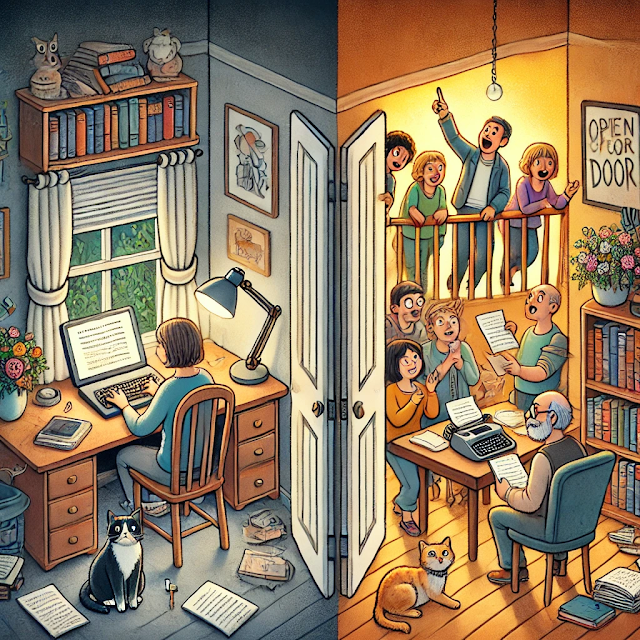Stephen King, the modern bard of Bangor, Maine, has unleashed many a chilling tale onto the unsuspecting public, but perhaps one of his scariest ideas has nothing to do with haunted hotels or telekinetic teenagers. No, it's his advice to writers: “write with the door closed, rewrite with the door open.” It sounds simple, right? But let's unpack this seemingly innocuous strategy that has surely led to more writerly neuroses than the passive voice.
The Door Closed: A Safe Space or a Trap?
First off, writing with the door closed. This is your fantasy land, your sandbox, your little den of creativity where the world's cacophony is barred entry. Picture it: Just you and your thoughts, maybe a cat draped over your keyboard, and a steaming mug of something caffeinated. The door is closed—literally and metaphorically—to all the naysayers, the grammar police, and your Aunt Edna who still thinks you should've been a dentist.
Here in your sanctum, you're free to write that epic space opera with singing aliens, or a deeply introspective look at the life of an ant with existential angst. No idea is too wild, no plot too thin. Want to pen a saga about ninja penguins? Go for it. Feel like exploring the love life of sentient spoons? No one's stopping you! This is the draft where adverbs proliferate like rabbits, and characters wander into plotless abysses.
But is it all sunshine and rainbows? Of course not. Writing with the door closed can turn your workspace into an echo chamber where every word you write reverberates like the voice of God. Without external feedback, how will you know if your ninja penguins are ridiculous in a good way, or just ridiculous?
The Door Open: Welcome to the Jungle
Then comes the terrifying part: rewriting with the door open. Now you swing wide the gates and let in everyone from your trusted writing circle to Internet trolls who still can't get over the fact that you used "there" instead of "their" in a 2009 blog post.
Rewriting with the door open means your beautiful, flawed manuscript gets thrown into the arena, and suddenly everyone's a critic. That metaphor you loved? It's cliché. Your favorite dialogue? Unrealistic. And don't get started on pacing—apparently, your book moves like a tortoise on sedatives.
But let's face it: it's necessary. The barbarians at the gates are not just there to pillage and burn. They're here to help you forge your manuscript into something stronger, sleeker, more impactful. They sharpen your sentences, deepen your characters, and maybe, just maybe, stop you from making a complete fool of yourself in front of the entire literate world.
The Perils and Pearls of the Open Door Policy
Of course, this stage is not without its dangers. Feedback can be addictive. You might start needing that validation like you need air. Each "good job!" or "I loved this part" is a hit of pure dopamine. Conversely, every critique can feel like a personal attack. Did someone question your main character's motivation? That's an affront to your creative genius!
And then there's the danger of too many cooks—or in this case, editors—spoiling the broth. If you listen to everyone, you might end up with a Franken-novel, a stitched-together mess that tries to please all but satisfies none. Remember, not all feedback is created equal. Sometimes, you've got to shut that door again, at least partway, to protect the integrity of your story.
Striking the Balance: Hermit or Social Butterfly?
Ultimately, King’s advice isn't about being reclusive or overly social. It’s about balance. Write that first draft for yourself. Let it be weird and wild and wondrous. Then, open the door and let the world make it better. Embrace the chaos that comes with feedback, sift through the noise for the nuggets of gold, and be ready to kill your darlings if they're dragging down the parade.
So, dear writers, gird your loins and prepare for battle. The path from first draft to final manuscript is fraught with peril, but armed with a sturdy door and a robust lock (or maybe a slightly less robust lock for the second draft), you are ready to face whatever the literary gods throw your way. Whether you end up a hermit or a social butterfly, remember: even a closed door has a key, and sometimes, the key to great writing is knowing when to use it.














0 Comments